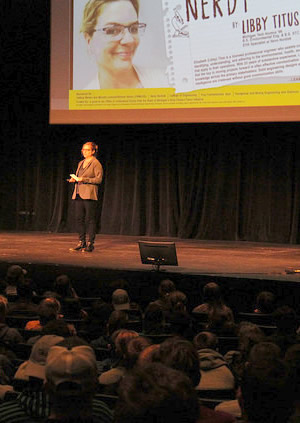
More than 1,200 first-year engineering and computer science students learned the “Secrets of Talking Nerdy” from Michigan Tech Alumna Elizabeth (Libby) Titus ’96 at Michigan Tech’s annual First-Year Engineering Lecture on September 6.
According to Titus, engineering and computer science are group activities: it won’t matter how smart you are if you can’t communicate your ideas. She offers these writing tips for engineers and scientists:
Be clear. “First thoroughly understand the subject yourself, then be a filter and interpreter for your audience. Strip away all complexity so others can understand with minimal effort.”
Make it attractive. “Organize your writing for the reader’s benefit. Use lots of white space. Make it easy to skim. Be consistent with your style choices for format and punctuation, and stick to one or two fonts at the most.”
Proofread. “Your boss or client should never have to correct your writing. Grammar police are everywhere, and we will scrutinize what you write! You will be earnestly judged. No matter how tight your deadline is, you have to proofread!”
Focus on your reader. “If your reader feels smart, you win. Use simple language, so your audience can understand the first time. Any reader might not read past the first two sentences.
Get to the point. Keep it brief. Words don’t bleed. Cut them!”
Don’t write the way you talk. “If you do that, you’ll add too many words. No one likes that. Ask yourself. How can I make it easier for my audience? The answer is simple: Get to the point.”
Creature comforts are crucially important. “To write well, you have to put yourself in a state of deep work. The cost of distraction is high, and it’s about the switch itself. For instance, switching from your project to check texts then back again, no matter how quickly, taxes your productivity much more than the duration of the time spent distracted. I used to think writing was persecution, then I realized I needed to have a grateful attitude. Make sure you have everything you need. Clear space. Natural light. Solitude, or with others working diligently. Ice water in a cup. Everyone’s different. Regular exercise helps me.”
Motivate yourself. “When I feel unmotivated, I remind myself why my work is important. I once had a job watching potatoes on a conveyor belt. All day long.”
Be grateful it’s not fiction! “As technical writers, we should all be grateful of the gift of content.”
Break up the writing into small chunks. Give yourself a deadline for each chunk. Just get started. After a break, it’s much easier to get back to something, rather than a blank page.
Remember, every first draft sucks. In your first draft, you’re just telling yourself the story.
Follow the Growth Mindset (Carol Dweck)
Embrace challenges.
Persist in the face of setbacks.
See effort as the path to mastery.
Learn from criticism.
Find lessons and inspiration in the success of others.
Keep yourself in the chair. You need willpower until the clock runs out, or your document is perfection! Staying in the game is a huge part of winning the game.
Get feedback. Tell lots of people. Crowdsource for ideas. See criticism as a gift. Try rejection therapy to desensitize. (She recommends googling “rejection therapy” to find a game invented by a Canadian Entrepreneur).
DO read user manuals! And more—read everything and skim everything you come across.
Tips for conciseness:
Try not to verbalize the scientific method.
Lead with the conclusion.
Keep sentences and paragraphs short.
Drop unnecessary words.
Write nothing longer than a page.
Read it one last time to slash as many words as possible.
Titus’s lecture was part of the Visiting Women and Minority Lecturer/Scholar Series (VWMLSS), funded by a grant to the Office of Institutional Equity from the State of Michigan’s King-Chavez-Parks Initiative. The event was sponsored by Novo Nordisk, and Michigan Tech’s College of Engineering, Department of Engineering Fundamentals, Department of Geological and Mining Engineering and Sciences, and Department of Computer Science.